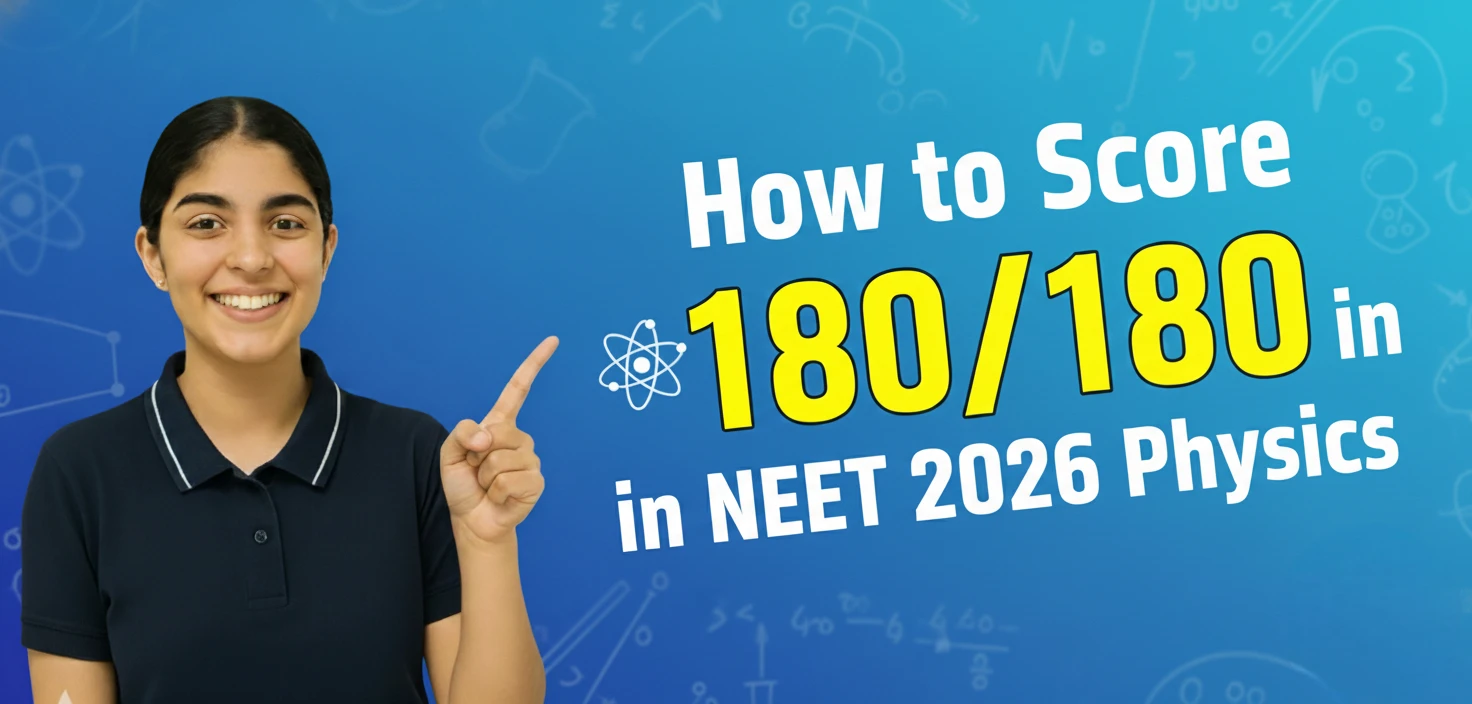Table of Contents
ToggleScoring 180/180 in Physics is a dream for every NEET aspirant. Then the question arises of how to score 180 in physics. The implementation of the right strategic approach, dedication, and roadmap can turn this dream into reality. For Physics in NEET 2026, it is important to master concepts, overcome the fear of numeric, do smart practice, and build speed & accuracy to get 180 marks.
Scoring high marks in Physics also helps in improving overall rank in NEET exam. For example, Matrix Education’s rank holder student Rekha Nitharwal scored 680 marks in 2023 where her good score in physics helped her in achieving overall AIR 1665 rank in NEET exam.
The blog will provide an in-depth step-by-step guide to scoring 180 marks in physics NEET. Apart from this, the blog will also provide suggestions for the NEET 2026 aspirants to score their targeted marks for Physics, such as 100, 120, 130, 140, 150, 160, and 170 for the upcoming exams.
Why Physics is Important for NEET 2026?
Physics is a crucial subject for NEET 2026 aspirants because it comprises 25% of the total marks (180 out of 720). The subject includes high-weightage topics such as Electrostatics, Modern Physics, and optics by making this an important subject for securing a good rank and admission to top medical colleges in NEET 2026.
During interaction with successful students, our team found that physics creates understanding for medical experience by helping in securing high marks with clearing concepts and problem-solving. Key factors associated with the importance of Physics for NEET 2026 are as follows-
- Potential of High Scoring
- High weightage topics
- Critical concepts
- Conceptual foundation
You should break your journey into parts, routine habits, revision strategies, discipline in mock tests, and a positive mindset if you really want to know how to score 180 in physics NEET.
Step-by-Step Preparation Guide to Score 180 Marks in NEET 2026 Physics
Step 1: Understand the Area to Cover with Pattern, Syllabus & Weightage
NEET Physics in 2026 Exam Pattern and Structure
- Total 45 Physics questions (180 marks).
- 4 marks are for each correct answer, and wrong answers give 1 negative mark. So, maintaining accuracy in targeting Physics is very important.
- The NEET 2026 Physics syllabus includes both Class 11 and Class 12 topics.
- It is recommended to score 40 to 43 questions with trying for negligible negative attempts to hit 180 marks.
Chapter-wise Weightage for NEET Physics
The chapter-wise weightage and question count for NEET Physics year 2024 & 25 are as follows-
| NEET UG 2025 Chapter Wise for Physics | NEET UG 2024 Chapter Wise for Physics | ||||
| SN | Chapters/Topics | Average No. of Questions in 2025 | 2025 Weightage (%) | Average No. of Questions in 2024 | 2024 Weightage (%) |
| 1 | Mechanical Properties of Solids | 1 | 2% | 1 | 2% |
| 2 | Moving Charges and Magnetism | 2 | 5% | 2 | 5% |
| 3 | Center of Mass & System of Particles | 1 | 2% | 1 | 2% |
| 4 | Wave Optics | 1 | 2% | 1 | 2% |
| 5 | Electromagnetic Induction | 1 | 3% | 1 | 3% |
| 6 | Mechanical Properties of Fluids | 2 | 3% | 2 | 3% |
| 7 | Electromagnetic Waves | 2 | 3% | 2 | 3% |
| 8 | Rotational Motion | 3 | 6% | 3 | 6% |
| 9 | Oscillations | 1 | 3% | 1 | 3% |
| 10 | Ray Optics and Optical Instruments | 3 | 6% | 3 | 6% |
| 11 | Kinetic Theory of Gases | 1 | 3% | 1 | 3% |
| 12 | Dual Nature of Radiation and Matter | 2 | 3% | 2 | 3% |
| 13 | Gravitation | 2 | 3% | 2 | 3% |
| 14 | Current Electricity | 5 | 10% | 5 | 10% |
| 15 | Semiconductor Electronics: Materials, Devices and Simple Circuits | 3 | 5% | 3 | 5% |
| 16 | Units and Measurements | 3 | 5% | 3 | 5% |
| 17 | Work Energy and Power | 2 | 3% | 2 | 3% |
| 18 | Electric Charges and Fields | 2 | 3% | 2 | 3% |
| 19 | Magnetism and Matter | 1 | 1% | 1 | 1% |
| 20 | Atoms | 1 | 3% | 1 | 3% |
| 21 | Nuclei | 2 | 4% | 2 | 4% |
| 22 | Motion in a Plane | 1 | 3% | 1 | 3% |
| 23 | Mathematical Tools & Vectors | 1 | 1% | 1 | 1% |
| 24 | Laws of Motion | 1 | 2% | 1 | 2% |
| 25 | Thermodynamics | 1 | 2% | 1 | 2% |
| 26 | Waves | 1 | 1% | 1 | 1% |
| 27 | Electrostatic Potential and Capacitance | 3 | 5% | 3 | 5% |
| 28 | Alternating Current | 2 | 4% | 2 | 4% |
| 29 | Thermal Properties of Matter | 0 | 1% | 0 | 1% |
| 30 | Motion in a Straight Line | 1 | 3% | 1 | 3% |
Easy & Scoring Chapters in Physics for NEET
Some chapters in Physics are simple to learn because they are based on concepts and yield good scores if done well. For example-
- Units, Measurements & Error Analysis
- Kinematics
- Photoelectric effect & atom
- Oscillations & Waves
- Optics (the major focus should be on Ray optics)
- Work, Energy & Power
- Current Electricity
The above-mentioned are the concept-based chapters for the NEET 2026 syllabus, where you can reliably score 8–12 out of 12 or even full in that chapter. You should use these subjects as scoring pillars when preparing for NEET 2026 Physics.
Step 2: Phase-wise Targeting: From 100 to 120 to 140 to 150 to 160 to 170, and then 180 marks
As a NEET 2026 aspirant, it can be your biggest mistake if you only focus on targeting 180 marks. You can gradually climb by achieving milestones. Below is an expert-suggested roadmap for this.
| Target Score | Areas to Focus on | Strategic Action/Moves |
| 100 | Clearing NCERT basics by finishing each chapter once. | You can read the NCERT books line by line by solving end-of-chapter problems by considering practical examples. |
| 120 | Solving Previous year questions & reference problems in relation to high-weightage chapters. | You can solve Daily Practice Problems, a specific time for chapter revision, and assigned problems. |
| 140 | Completing the full syllabus by integrating cross-chapter numerical. | Take an active part in mixed tests by identifying the weak zones |
| 150 | Improving accuracy, speed by eliminating the scope for silly errors and repeating difficult topics | Mock test participation, detailed error logs and revising formulas regularly. |
| 160 | Strengthening weak sections. For example: velocity in attempting new/unseen questions | Focus on clearing tough problems, conceptual depth, and time-bound mocks. |
| 170 | Eliminating any gap, perfect mixed mocks, and shortlisting tricky topics. | Taking part in 8-10 mocks with positive attempts and examining the negative marks. |
| 180 | Achieving full accuracy in mocks by regularly maintaining a positive environment for the exam. | Focus on stress management with flawless exam day performance by leaving minimal scope for silly mistakes. |
For the different mark stages, you should focus on building positive confidence and mastery by not jumping before consolidating.
Step 3. Building the Strong Foundation for NEET 2026 Physics: NCERT & Concept Clarity
Why is NCERT non-avoidable?
- Patterns from recent years identified that 90 to 95% of NEET Physics theory is derived from the NCERT.
- Most of the Physics direct practical statements and concept explanations are covered in the NCERT.
- Solid control on the NCERT provides you a backbone for solving the tougher problems.
How to study NCERT with maximum utilization?
- You should focus on reading slowly by including footnoting for every line. You should not skip the text.
- After successful completion of each chapter, ask a question to yourself: Do I really understand this? or Could I explain it to someone?
- Always maintain marginal notes in your own language in a short note-making approach.
- Solving all the identified exercise problems at the end of each chapter. This is mainly for the last revision purpose.
- You can also use NCERT exemplar problems for taking deep challenges.
Balancing the right combination of NCERT with reference books
After the completion of the NCERT, you can pick a good reference book for each topic, such as H C Verma, I.E. Irodov, selectively, DC Pandey Concept Series, and many more. You should focus on one book only because using multiple books may confuse you, so use reference books only for additional numerical practice, tricky ideas and varied applications.
Step 4: Time Management & Daily Planning
You should focus on making a personalized or sustained daily routine, because it makes a difference between achievers and dreamers. The following is an attached time management template for 4 to 5 hours reserved for Physics in your plan
| Time Slot | Activity to Perform | Role and Importance |
| 1 hour | Revising previous year formulas by making short revision notes. | To keep the memory fresh |
| 1 hour | Reading a new theory from the NCERT / reference books | Build concepts strongly |
| 1 hour | You should solve at least 15 to 20 numerical / PYQ questions from that topic. | Practice is key |
| 30 min | Participating quick mixed review of earlier chapters (flashcards, memory joggers) | For the retention of older chapters |
| 30 min | Focus on doubt clearing, error analysis, and revisiting tricky problems | Consolidation |
Special tip: You can practice the above cycles in different blocks by sticking to the schedule even when motivation dips.
Step 5: Important Topic-wise strategies: A Focused Approach for NEET 2026 Physics
A chapter-wise focus plan for helping you in how to score in NEET physics systematically is as follows:
- Units & Measurement / Error Analysis: Master dimensional analysis, error propagation, significant figures. Good scoring if clean.
- Kinematics: Focus on different motion types, vector resolution, and relative motion.
- Work, Energy & Power: Derivation of work-energy theorem, potential energy, power, conservative vs non-conservative forces.
- Laws of Motion: Free body diagrams, friction, Newton’s laws, impulse & momentum, collisions.
- System of Particles & Rotational Motion: Centre of mass, rigid body rotation, torque, angular momentum, moment of inertia.
- Gravitation: Kepler’s laws, universal law, satellites, escape velocity.
- Properties of Solids & Liquids / Fluids: Stress-strain, Hooke’s law, viscosity, Bernoulli’s principle.
- Thermodynamics: Laws, Carnot cycle, entropy, thermodynamic processes, heat capacities.
- Kinetic Theory: Maxwell’s distribution, kinetic gas equation, root mean square speed.
- Oscillations & Waves: Simple harmonic motion, wave equation, superposition, Doppler effect.
- Electrostatics: Coulomb’s law, Gauss’s law, electric field, potential, work done, continuous charge distributions.
- Current Electricity: Resistivity, Ohm’s law, series/parallel circuits, Kirchhoff’s laws, potentiometer.
- Moving Charges & Magnetism: Biot–Savart, Ampere’s law, magnetic fields, force on moving charges.
- Electromagnetic Induction & AC: Faraday’s law, Lenz’s law, self/ mutual induction, RLC circuits, AC formulas.
- Electromagnetic Waves: Maxwell’s equations (qualitative), wave nature, propagation.
- Optics (Ray & Wave): Reflection, refraction, lenses, mirrors, interference, diffraction, polarization.
- Dual Nature / Photoelectric: Photoelectric effect, de Broglie, matter waves.
- Atoms & Nuclei: Rutherford model, Bohr’s model, radioactivity, nuclear fission/fusion.
- Electronic Devices / Semiconductor: Diode, transistor (basic), doping.
For the successful completion of each chapter, you should focus on considering the following approach to get high marks in NEET 2026 Physics.
For each chapter, do the following:
- Reading theories.
- Solving NCERT problems
- Solving PYQs (Previous Year Question) + DPPs (Daily Practice Problem)
- Solving mixed numerical sets.
You should focus on solving 50–100 questions per chapter over multiple chances until you’re comfortable with that specific chapter.
Step 6: Revision & Memory Techniques
NEET 2026 Physics preparation is incomplete without creating a robust plan for how to score full marks in Physics NEET.
Spaced Revisions
- After finishing a chapter, revise after 1 day, then after 3 days, then after 7 days, then monthly.
- You can make a revision strategy that, after completing each chapter, revise after 1 day, then after 3 days, then after 7 days, and then monthly.
- You can also use a revision planner or calendar to improve the revision process.
Formula Sheet & Flash Cards
- You can maintain a master formula sheet with section-wise formulas and tricky point reminders for the last-minute preparation.
- Using flashcards in a personalized method, where the front includes- concept name, back includes- formula or quick note. You can carry them and review them as per your requirement in your idle time.
Short Notes & Mind Maps
For each chapter, you can prepare or add a one-page summary for each chapter, which includes all necessary information, such as concepts and formulas.
- You can focus on using mind maps by linking them to multiple chapters (For example, energy concepts across mechanics & thermodynamics).
- Before taking part in mock tests, you can take a glimpse at all your summaries in 15 to 20 minutes.
Error Log
- You can maintain a separate mistake notebook, which includes every wrong question, record type, reason, and correct method.
- Before starting any new study session, you can revise the various entries of this notebook to reduce repetitive mistakes.
Step 7: Mock Tests, Analysis & Strategy Tweaks
Mock tests are considered a mirror for your NEET 2026 Physics preparation. You can use it effectively to achieve the goal of scoring good marks in NEET physics.
Choosing Mock Tests:
- You can pick 3 to 4 most relevant and quality-based full syllabus tests. There are various sources available on various platforms, coaching and reputed publishers.
- You can also target for higher marks by picking subject-wise/numerical-only tests.
- You can also make a preference by testing the detailed solutions and performance analytics.
Frequency & Phases
- Covering 1 full mock weekly + topic tests
- Mid-stage: 2 mock tests weekly
- You can prepare for the last 2 months by participating in 3 to 4 mocks per week
- For the last 2–3 weeks: one mock test every day
Step 8: Targeted Strategies for Each Milestone
The table below clearly outlines targeted strategies to achieve different milestone marks in physics by offering step-by-step guidance to improve accuracy, speed, and overall performance at each level.
| Target Score | Key Focus Areas & Strategies |
| How to Score 100 in NEET Physics | You should focus on solving easy and medium-level problems of the NCERT.You should focus on practicing 25–30 correct attempts. Use the error log system for mock tests to avoid repeating trivial mistakes. Using the error log approach from mock tests by avoiding repetitive mistakes. |
| How to Score 120 in Physics NEET | You should identify the weak concepts/chapters from high-weightage chapters. Identify weak chapters and give them extra practice. Effective identification of weak chapters by practicing them extra. Increasing overall mock frequency. Focusing on allocating 40–45 minutes for the full physics section. |
| How to Score 130 in Physics NEET | Focusing on accuracy improvement by eliminating the scope for penalty marks. Attempting at least 35–38 correct questions. Focus on solving advanced problems to gain confidence. |
| How to Score 140 in Physics NEET | The syllabus should be roughly complete. Practicing mixed problems from multiple chapters.Focus on attempting 38 Physics questions correctly with less scope for mistakes. |
| How to Score 150 in Physics NEET | Improving overall speed and accuracy. Attempting 40+ good questions. Reducing the overall level of silly mistakes (calculation slips and conceptual misreading)Using the last 2 months’ time period for an intense mock practice. |
| How to Score 160 in Physics NEET | Prioritizing harder questions with confidence. The focus should be on keeping a calm exam temperament environment. Focusing on including 42 to 43 correct with a scope for a minimum of 1–2 errors. Making a revision strategy and formula mastery. |
| How to Score 170 in Physics NEET | Attempting harder questions only if you are sure. Maintaining strict negative marking discipline. Always staying consistent and calm during the mock tests. Achieving full accuracy in at least 3–4 mocks for confidence. |
| How to Score 180 in Physics NEET | Focusing on achieving perfect mock test scores. Complete elimination of the scope of guesswork in the final examination. Double cross check for the answers with the validation of units and signs. Always stay composed during the exams, because one silly mistake will create a barrier in achieving this goal. |
Step 9: Putting All the Efforts Together: A Sample 8-Month Timeline for NEET Physics 2026
Below is a sample timeline (you can also personalize it as per your requirement), which will help you in achieving your goal of scoring full marks in physics NEET.
| Months | Focus Areas | Activities |
| Month 1–2 | NCERT + basics | Finishing classes 11th and 12th NCERT by making short notes and solving end-of-chapter problems. |
| Month 3 | Starting PYQs & reference practice | For the first 5 to 6 chapters, complete all the PYQs and reference problems. |
| Month 4 | Full syllabus coverage | Finishing the remaining chapters by starting mixed topic tests. |
| Month 5 | First round mocks + analysis | Attempting 1 mock/week test with strong error log usage. |
| Month 6 | Improving weak zones | Participating in extra sessions for weak chapters, mixed mocks at least 2 per week. |
| Month 7 | Intensive mock test practice | Taking part in 3 to 4 mocks per week and full-time tests as per the real NEET exam conditions. |
| Month 8 (last 3–4 weeks) | Final revisions & preparation | The last preparation month should be for revision and doubt clearing by attempting daily mocks, practicing mental conditioning and revision of the formula sheet. |
The timeline mentioned above outlines a path from how to score 100 in NEET physics toward how to score 180 by improving the overall confidence and clarity.
Conclusion
Scoring 180 marks in NEET 2026 Physics is not impossible, but it is a disciplined journey from beginning to mastery. You should start by completing the NCERT books, building strong concepts, and following a phased approach for climbing by using regular mocks and revision smartly.
The implementation of the above-discussed step-by-step approach for how to score in NEET physics helps you to score full marks in NEET physics. You should believe in yourself by evolving yourself to reflect your efforts on the answer sheet.










